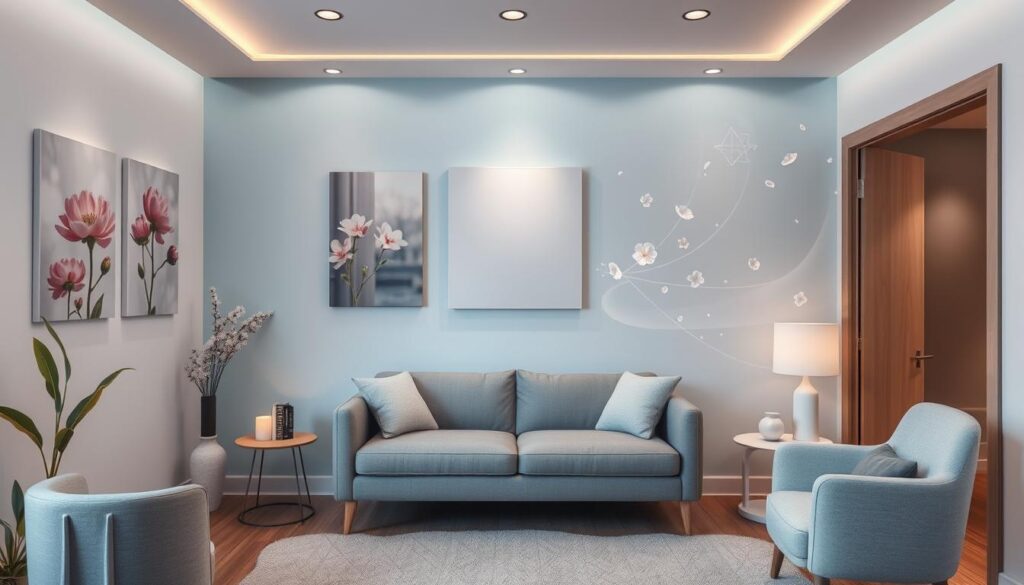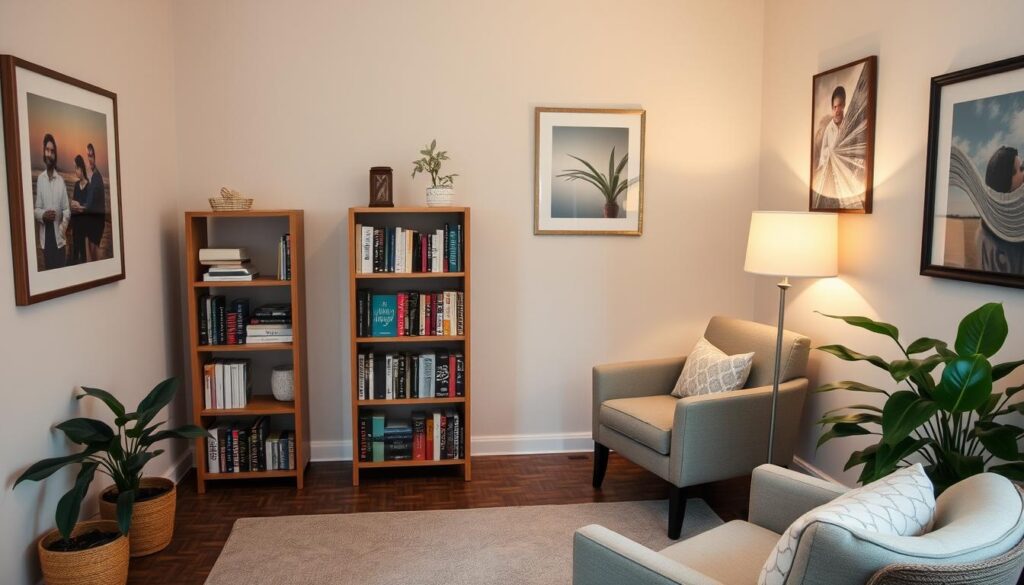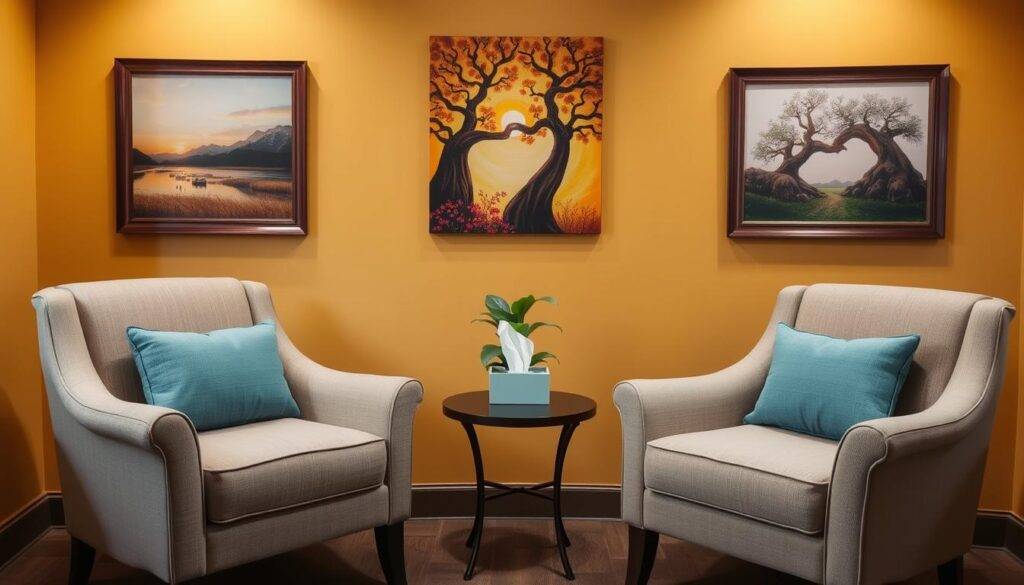Starting couples counseling often begins with one partner seeing the need for help. The other might not be so sure. Couples usually go into therapy with mixed feelings, wondering if it will really help. It’s key to know what to expect and how both partners can help make it work.
Going into couples counseling means setting realistic hopes and being ready for tough truths. It takes time, effort, and patience to see real changes. Counseling can greatly improve how you talk to each other and feel about your relationship. A good therapist is crucial in guiding you towards positive changes.
Many couples find that counseling helps them feel closer and understand each other better1. Setting boundaries can also make your relationship healthier1. A skilled therapist can help you work through these changes, making sure both partners feel heard and valued.
Table of Contents
Key Takeaways
- Understand therapy expectations to foster realistic outcomes.
- The active participation of both partners is crucial for success.
- Benefits of counseling include improved communication and relationship dynamics.
- A good therapist can significantly influence the success of counseling.
- Time, effort, and patience are essential components for growth within therapy.
To learn more about setting the right expectations for couples counseling, visit this detailed article.
Understanding the Basics of Couples Counseling
Couples counseling helps partners work through tough issues they can’t solve alone. It’s a place where both can share their feelings and actions with a trained therapist’s help.
What Is Couples Counseling?
Couples counseling is when both partners talk together in sessions. Sometimes, one partner might have a session alone to share important relationship info2. It usually lasts about 12 sessions, but can take longer depending on the couple’s needs2.
Each session is about 90 minutes. They might focus on different levels of the Sound Relationship House3. Some therapists even offer weekend or marathon sessions that last up to six hours a day23.
Common Reasons Couples Seek Therapy
Couples go to marriage counseling for many reasons. These include communication problems, cheating, and sexual issues. Studies show that couples who go to therapy often see big improvements over time3.
Therapy costs between $150 to $400 per hour. It’s usually done once a week2. But, it’s not covered by insurance because it’s not seen as medically necessary2. Still, some programs offer lower prices for those who can’t afford it23.
Therapists can help with many issues, like cheating, violence, and even personal problems like depression or addiction2.
For more help with legal issues from car accidents, you might want to talk to an injury attorney.
Setting Realistic Expectations for Your Counseling Journey
Starting couples counseling with clear expectations can greatly improve results. It’s important to know that therapy is a team effort. Understanding the roles of the therapist and participants is key to success.

The Role of the Therapist
In couples counseling, the therapist supports the relationship, not just one partner. They work to help both sides grow and understand each other better. Before starting, a phone call helps tailor the sessions to your needs4.
The therapist leads conversations that help you look inward and understand each other. They help you create a therapy plan together in your first meeting4. The goal is to improve your relationship’s health and happiness, not just fix problems5.
Your Role as a Participant
Your active role in therapy is vital for success. Being open to change and growth is essential. This journey has ups and downs, but they are part of growing together5.
Regularly attending and actively participating in sessions is crucial. Skipping sessions can lead to frustration and unmet goals5. Reflecting on your experiences and practicing new skills between sessions also helps.
Therapy retreats offer special tools and exercises to help you grow4. Combining therapy with activities like hiking or yoga can also help heal your relationship4. For more support, visit this resource.
Challenges You May Face During Counseling
Starting couples counseling can bring up many challenges. Many couples have wrong ideas about how therapy works.
Common Misconceptions
One big mistake is thinking therapy will fix everything fast. But, fixing deep issues takes time and effort. About 70 percent of couples see real, lasting changes6.
Another myth is that therapists take sides. But, good therapy is fair and balanced. Both partners must work together to overcome hurdles.
Managing Discomfort and Resistance
Dealing with tough issues can make couples uncomfortable. They might resist or deny problems. The first sessions can make things worse as hidden issues are revealed.
Most couples argue because one partner won’t take blame7. And, every relationship faces hurt or injury7. But, facing these issues is key to growing stronger together.
Therapy for couples is tough, even for therapists. Most are trained for individual therapy, not couples8. Yet, 80 percent of private practice therapists do couples therapy8. This shows its value, despite the challenges.
Couples should stick with therapy, knowing it’s hard but worth it. Learning to communicate well can fix many problems7. This leads to lasting, positive changes in the relationship.
The Importance of Finding the Right Therapist
Finding the right therapist is key for a good counseling experience. It’s important to look at the therapist’s qualities. The right therapist can make a big difference, helping you and your partner feel understood and supported.
Criteria for Choosing a Therapist
When picking a therapist, think about their experience and how well they connect with both partners. Getting referrals from friends, family, or your doctor is a good start9. A strong bond between the therapist and client is also vital for success10. Using in-network therapists can also save you money9. Websites like Psychology Today and university psychiatry departments can help you find therapists9.

Specializations and Expertise
It’s crucial to check the therapist’s area of expertise. Psychiatrists are best for severe mental health issues9. Psychologists offer extensive training and testing9. LCSWs are great for psychotherapy and social services9. MFTs focus on couples and family counseling9.
Ask about treatments like CBT and Interpersonal Therapy, which work well for anxiety and depression9. It’s also good to find a therapist who knows about your specific issues, like addictions or LGBT concerns.
Couples Counseling Near Me: How to Find the Best Options
Looking for a counselor for couples can help fix relationship problems and make bonds stronger. Start by looking up local therapists. Check their qualifications, how they work, and if they have special training like the Gottman Method11.
Couples often wait too long to get help, waiting six years on average. This shows how important it is to find therapy easily11. Use online directories and ask for recommendations from doctors or friends. In Philadelphia, you can find therapists with different levels of expertise, like Level 1 and Level 3 Gottman therapists11.
It’s also key to find a therapist who accepts your insurance. This makes therapy more affordable. In Philadelphia, many therapists accept various insurance plans, including Aetna and AmeriHealth Administrators. Some even offer self-pay options for those without insurance12.
Therapists can help with many issues, like domestic abuse and behavioral problems. They also support different groups, like LGBTQIA+ and veterans12. Platforms like Grow Therapy offer both online and in-person sessions. This makes it easier for couples to find a time that works for them13.
It’s important to talk clearly with potential therapists about how they work, session length, and when they are available. This ensures they meet your needs1213.
Reading customer reviews and ratings can also help. They give insights into what other couples think. This can help you choose the right therapist for your needs12.
For more tips on picking the right counselor, visit here. It can help you find a skilled counselor for your relationship11.
Initial Sessions: What to Expect
The first sessions of couples counseling are key to a successful journey. These sessions usually last an hour or two. They set the stage for what comes next14.
The therapist learns about the couple’s history, conflicts, and how they handle problems. This helps tailor the therapy to fit their needs.
Information and History Gathering
The therapist digs into the relationship’s past to find important issues. They look at attachment styles, how the couple communicates, and trust. They might also talk about money and childhood experiences14.
Being open and honest is crucial. It helps build trust and a strong foundation for the therapy15.
Establishing Goals and Plans
Setting goals is a big part of the first session. The therapist helps the couple create a plan. They focus on improving communication, solving conflicts, and building intimacy14.
This planning is key. It makes sure both partners are working towards the same goals. They’re ready to make real changes.
Later sessions will focus on reaching these goals. They might include ‘homework’ to think about the relationship14. This keeps the couple involved and helps solve long-standing problems15.
The length of therapy varies based on goals and progress. It’s important for both partners to be active and change their behaviors for lasting change14.
How to Prepare for Couples Counseling
Getting ready for couples counseling means both partners need to be in the right mindset. This includes being ready to face challenges, willing to learn, and open to self-reflection. Emotionally, they should be ready for some discomfort but also for the chance to grow and heal together. This readiness is key to fully engaging in the therapy process.
Entering Counseling with the Right Mindset
Starting therapy with the right mindset is essential for success. Couples often wait a long time before seeking help, which can make the beginning harder16. So, getting into the right mindset early can help a lot.
Goals for therapy can vary but often include better communication, managing emotions, and building trust. Couples might also aim to resolve conflicts, make their relationship more fulfilling, and share responsibilities16.
Mental and Emotional Preparation
Being mentally and emotionally prepared is crucial for therapy. It’s important to know that therapy can be uncomfortable but also to be ready to fully participate. Emotionally Focused Therapy (EFT) and the Gottman Method are effective approaches. Dr. Lisa Hardebeck is fully certified in both, offering a strong framework for couples17.
The EFT method is backed by the American Psychological Association and has helped many couples. Sessions cost $275 for 80 minutes, with ad-hoc sessions at $325 and discernment counseling at $425. This shows it’s a serious investment that requires emotional commitment17.
This preparation, along with a strong mindset for counseling, lays a solid foundation for couples starting therapy. It ensures they are ready to get the most out of each session.
Benefits of Engaging Fully in the Process
Getting fully into couples counseling can bring big rewards. You’ll learn better communication and feel closer to your partner. It’s good for all kinds of couples, whether you’re deeply in love or just get along well18.

One key benefit is learning how to solve conflicts. In counseling, you and your partner learn to understand each other better. This leads to better relationships over time18.
Counseling aims to bring back love, respect, and intimacy. It helps partners grow together and face life’s challenges18.
Even happy couples face tough times. They might deal with infertility, mental health issues, or financial problems. Counseling gives them the tools to handle these challenges and grow together18.
The American Psychological Association (APA) says marriage counseling is very effective. Using methods like Emotionally-Focused Therapy (EFT), couples can improve their relationship and bond emotionally19.
- Personal Growth: Counseling helps you understand yourself better and grow emotionally.
- Therapy Rewards: Learning to communicate well in therapy makes your relationship more fulfilling.
- Relationship Improvements: You can rebuild trust, intimacy, and respect, making life more satisfying.
For those thinking about starting a family or dealing with infidelity, counseling is a safe space. By fully embracing the process, couples get the help they need for lasting growth and better relationships18.
Conclusion
Starting a counseling journey can change a couple’s relationship for the better. It’s important to have realistic expectations to get the most out of it. A licensed therapist is key, but both partners must be fully involved for it to work.
Dealing with early hurdles and myths is part of the journey. In places like Charlotte and Mooresville, couples find many therapy styles to fit their needs20. This variety helps couples tackle different issues, whether it’s preventing problems or dealing with them when they arise.
By embracing change and fully participating, couples can build stronger, more fulfilling relationships. Finding the right therapist is crucial for success21. With the right therapist and commitment, couples can grow closer, improve communication, and handle future challenges better.







